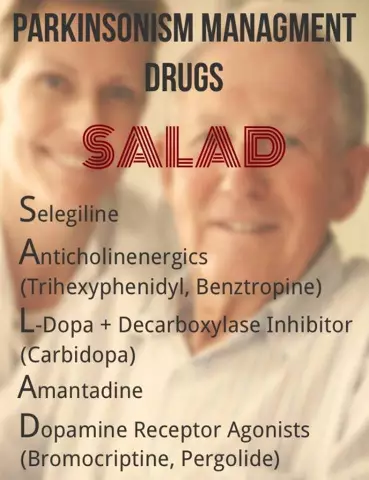- Author Rachel Wainwright wainwright@abchealthonline.com.
- Public 2023-12-15 07:39.
- Last modified 2025-11-02 20:14.
MAO inhibitors
Instructions for use:
- 1. Pharmacological action
- 2. List of drugs
- 3. Indications for use
- 4. Contraindications
- 5. Side effects
MAO inhibitors are antidepressants used in the treatment of parkinsonism and narcolepsy.
Pharmacological action of MAO inhibitors

MAO inhibitors are classified according to their pharmacological properties into non-selective, irreversible, reversible, selective, and irreversible, selective.
Non-selective irreversible MAO inhibitors are similar in chemical structure to iproniazides, improve the general condition of patients with depression and reduce angina attacks.
Reversible selective MAO inhibitors have antidepressant and psycho-energizing effects, actively suppress the deamination of serotonin and norepinephrine.
Irreversible selective MAO inhibitors have an antiparkinsonian effect and are involved in the metabolism of dopamine and catecholamines.
List of MAO inhibitor drugs
The list of non-selective irreversible MAO inhibitors includes:
- Fenelzine;
- Iproniazide;
- Isocarboxazid;
- Nialamide;
- Tranylcypromine.
Selegiline is referred to as irreversible selective MAO inhibitors.
The list of reversible selective MAO inhibitors includes:
- Metralindol;
- Pirlindol;
- Befol;
- Moclobemide;
- Derivatives of beta-carbolines.
Indications for the use of MAO inhibitors
Non-selective irreversible MAO inhibitors are prescribed for the treatment of chronic alcoholism and depressions (neurotic, involutional and cyclothymic), reversible selective - for depression of various origins, depressive syndrome, melancholic syndrome and asthenoadynamic disorders, and irreversible selective - in the treatment of Parkinson's disease.
Contraindications
Reception of reversible selective MAO inhibitors is contraindicated in:
- Hypersensitivity;
- Acute inflammatory diseases of the kidneys and liver;
- Withdrawal alcohol syndrome;
- Pregnancy and lactation.
Also, reversible selective MAO inhibitors are not prescribed in infancy.
Taking non-selective irreversible MAO inhibitors is not prescribed for:
- Hypersensitivity;
- Liver failure;
- Cerebral circulation disorders;
- Chronic renal failure;
- Chronic heart failure.
The use of irreversible selective MAO inhibitors is contraindicated in:
- Pregnancy and lactation;
- Taking other antidepressants;
- Hypersensitivity;
- Essential tremor;
- Chorea of Huntington.

With caution, irreversible selective MAO inhibitors are prescribed for:
- Progressive dementia;
- Tardive dyskinesia;
- Severe psychosis;
- Peptic ulcer of the gastrointestinal tract;
- Hyperplasia of the prostate gland;
- Severe angina pectoris;
- Closed-angle glaucoma;
- Coarse tremor;
- Tachycardia;
- Pheochromocytoma;
- Diffuse toxic goiter.
Side effects
The use of reversible selective MAO inhibitors can cause:
- Anxiety;
- Dry mouth;
- Headache;
- Insomnia.
The use of non-selective irreversible MAO inhibitors can cause:
- Dyspepsia;
- Decrease in blood pressure;
- Anxiety;
- Insomnia;
- Headache;
- Dry mouth;
- Constipation.
The use of irreversible selective MAO inhibitors can cause complications from various body systems, namely:
- Decreased appetite, dryness of the oral mucosa, increased activity of transaminases, nausea, diarrhea, constipation and dysphagia (digestive system);
- Increased fatigue, insomnia, dizziness, hallucinations, headache, anxiety, dyskinesia, motor and mental agitation, confusion and psychosis (nervous system);
- Increased blood pressure, orthostatic hypotension and arrhythmia (cardiovascular system);
- Diplopia and visual acuity disorders (sense organs);
- Nocturia, urinary retention and painful urge to urinate (urinary system);
- Shortness of breath, photosensitivity, skin rash and bronchospasm (allergic reactions).
Also, the intake of irreversible selective MAO inhibitors can cause perspiration, hypoglycemia and hair loss.
Information about the drug is generalized, provided for informational purposes only and does not replace the official instructions. Self-medication is hazardous to health!






